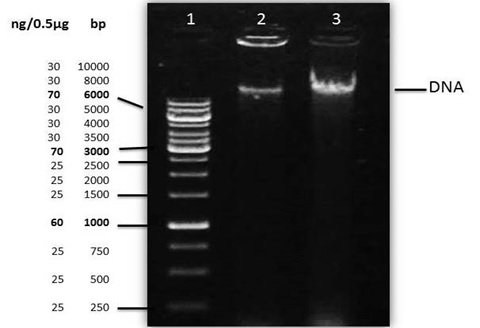Molecular Characterization of the Begomovirus Associated Satellites Infecting Spinacia Oleracea and Capsicum Annum Plants in Kohat, Pakistan
Abstract
 Abstract Views: 296
Abstract Views: 296
Begomovirus is a major and economically important genus of the Geminiviridae family. It comprises a wide range of viruses that infect a number of dicot plants including the horticulture crops, cereal crops, aromatic plants, vegetable crops, medicinal plants and weeds in various regions of the world. This study aims to investigate and correlate the various symptoms of begomovirus / satellites in different plants grown in the vicinity of Kohat, Pakistan. Furthermore, the characterization of the selected virus-associated satellites at the molecular level is also studied. Samples of suspected plants showing begomoviral infection were collected from the Kohat District. Genomic DNA was extracted from the infected plants and subjected to PCR using DNA-1/DNA-2 and Beta01/Beta02 for alpha satellites and beta satellites, respectively. The amplified PCR products were cloned and sequenced commercially. After sequencing, in silico sequence and phylogenetic analysis was also performed. Our study discovered that many plants in the Kohat District display begomovirus and satellite disease symptoms with mild to extreme disease severity. Disease incidence is especially high in okra. Beta satellites were isolated and sequenced from Spinacia oleracea and Capsicum annum plants and they showed more than 90% sequence similarity with chilli leaf curl and tomato leaf curl beta satellites. The existence of betasatellites in spinach and chilli plants was discovered for the first time in the Kohat region. Moreover, the distribution of these highly pathogenic variants of chilli leaf curl and tomato leaf curl betasatellites in the district Kohat has been reported previously.
Copyright (c) The Author
Downloads
References
Gutierrez C. Geminiviruses and the plant cell cycle. Plant Mol Bio. 2000 Aug;43(5):763-72.
Moffat AS. Geminiviruses emerge as serious crop threat. Sci. 1999 Dec 3;286(5446):1835.
Zhang W, Olson NH, Baker TS, et al. Structure of the Maize streak virus geminate particle. Virol. 2001 Jan 20;279(2):471-7. https://doi.org/10.1006/viro.2000.0739
Jeske H. Replication of geminiviruses and the use of rolling circle amplification for their diagnosis. InTomato Yellow Leaf Curl Virus Disease. Springer, Dordrecht.2007:141-156
Van Regenmortel MH, Bishop DH, Fauquet CM, et al. Guidelines to the demarcation of virus species. Arch Virol. 1997 Jul;142(7):1505-18.
Brown JK, Coats SA, Bedford ID, et al. Characterization and distribution of esterase electromorphs in the whitefly, Bemisia tabaci (Genn.)(Homoptera: Aleyrodidae). Biochem Genetics. 1995 Aug;33(7):205-14.
Navas-Castillo J, Fiallo-Olivé E, Sánchez-Campos S. Emerging virus diseases transmitted by whiteflies. AnnRev Phytopathol. 2011 Sep 8;49:219-48.
Varma A, Malathi VG. Emerging geminivirus problems: a serious threat to crop production. Ann Appl Bio. 2003 Apr;142(2):145-64.
Morales FJ, Anderson PK. The emergence and dissemination of whitefly-transmitted geminiviruses inLatin America. ArchVirol. 2001Mar;146(3):415-41.
Ribeiro SG, Ambrozevicius LP, Avila AC, et al. Distribution and genetic diversity of tomato-infecting begomoviruses in Brazil. ArchVirol. 2003 Jan 1;148(2):281-95.
Mansoor S, Zafar Y, Briddon RW. Geminivirus disease complexes: the threat is spreading. Trends Plant Sci. 2006 May 1;11(5):209-12.
Padidam M, Sawyer S, Fauquet CM. Possible emergence of new geminiviruses by frequent recombination. Virol. 1999 Dec 20;265(2):218-25.
Paximadis M, Idris AM, Torres-Jerez I, et al. Characterizationof tobacco geminiviruses in the old and new world. Arch Virol. 1999 Apr 1;144(4):703-17.
Stanley J, Bisaro DM, Briddon RW, et al. Family geminiviridae. Virus taxonomy: Eighth Report of the International Committee on Taxonomy of Viruses. 2005 Jan 1:301-26.
Hanley-Bowdoin L, Settlage SB, Orozco BM, et al. Geminiviruses: models for plant DNA replication, transcription, and cell cycle regulation. CritRev Plant Sci.1999 Jan 1;18(1):71-106.
Brown JK, Fauquet CM, Briddon RW, et al. Geminiviridae: In King AM, Adams MJ, Carstens EB, et al (eds) Virus Taxonomy-Ninth Report of the International Committee on Taxonomy of Viruses. Associated Press, Elsevier Inc.2012:351-373.
Etessami P, Watts J, Stanley J. Size reversion of African cassava mosaic virus coat protein gene deletion mutants during infection of Nicotiana benthamiana. J Gen Virol. 1989 Feb 1;70(2):277-89.
Bisaro DM. Geminivirus DNA replication. DNA Replication in Eukaryotic cells.1996;33:833-54.[19]Rojas MR, Hagen C, Lucas WJ, et al. Exploiting chinks in the plant's armor: evolution and emergence of geminiviruses. Annu. Rev. Phytopathol. 2005 Jul 28;43:361-94.
Rojas MR, Noueiry AO, Lucas WJ, et al. Bean dwarf mosaic geminivirus movement proteins recognize DNA in a form-and size-specific manner. Cell. 1998 Oct 2;95(1):105-13.
Scholthof KB, Adkins S, Czosnek H, et al. Top 10 plant viruses in molecular plant pathology. MolPlant Pathol. 2011 Dec;12(9):938-54.
Padidam M, Beachy RN, Fauquet CM. The role of AV2 (“precoat”) and coat protein in viral replication and movement in tomatoleaf curl geminivirus. Virol. 1996 Oct 15;224(2):390-404.
Molecular Characterization of the Begomovirus...56Department of Life SciencesVolume 2 Issue 4, 2020
Rybicki EP. A phylogenetic and evolutionary justification for three genera of Geminiviridae. Arch Virol. 1994 Mar 1;139(1-2):49-77.[24]Iram, S., Amrao, L., Mansoor, M. S., Malik, A. H., Briddon, R. W., & Zafar, Y. (2005). First report of a begomovirus associated with leaf curl disease of Duranta erecta in Pakistan.Plant Pathology,54(2), 260-260. https://doi.org/10.1111/j.13653059.2005.01129.x
Saeed ST, Samad A. Emerging threats of begomoviruses to the cultivation of medicinal and aromatic crops and their management strategies. Virusdisease. 2017 Mar 1;28(1):1-7.
Tahir MN, Amin I, Briddon RW, et al. The merging of two dynasties—identification of an African cotton leaf curl disease-associated begomovirus with cotton in Pakistan. PLoS One. 2011 May 26;6(5):e20366.
Amrao L, Akhter S, Tahir MN, et al. Cotton leaf curl disease in Sindh province of Pakistan is associated with recombinant begomovirus components. Virus Res. 2010 Oct 1;153(1):161-5.
Mubin M, Briddon RW, Mansoor S. Complete nucleotide sequence of chili leaf curl virus and its associated satellites naturally infecting potato in Pakistan. Arch Virol. 2009 Feb 1;154(2):365-8.
Fauquet CM, Bisaro DM, Briddon RW, et al. Revision of taxonomic criteria for species demarcation in the family Geminiviridae, and an updated list of begomovirus species. Arch Virol. 2003 Feb 1;148(2):405-20.[30]Rajagopalan PA, Naik A, Katturi P, et al. Dominance of resistance-breaking cotton leaf curl Burewala virus (CLCuBuV) in northwestern India. Arch Virol. 2012 May;157(5):855-68.

Copyright (c) 2020 Ali Shah, Ayesha Ayub, Malik Nawaz Shuja, Taj Ali, Fazal Akbar

This work is licensed under a Creative Commons Attribution 4.0 International License.
BSR follows an open-access publishing policy and full text of all published articles is available free, immediately upon publication of an issue. The journal’s contents are published and distributed under the terms of the Creative Commons Attribution 4.0 International (CC-BY 4.0) license. Thus, the work submitted to the journal implies that it is original, unpublished work of the authors (neither published previously nor accepted/under consideration for publication elsewhere). On acceptance of a manuscript for publication, a corresponding author on the behalf of all co-authors of the manuscript will sign and submit a completed the Copyright and Author Consent Form.










